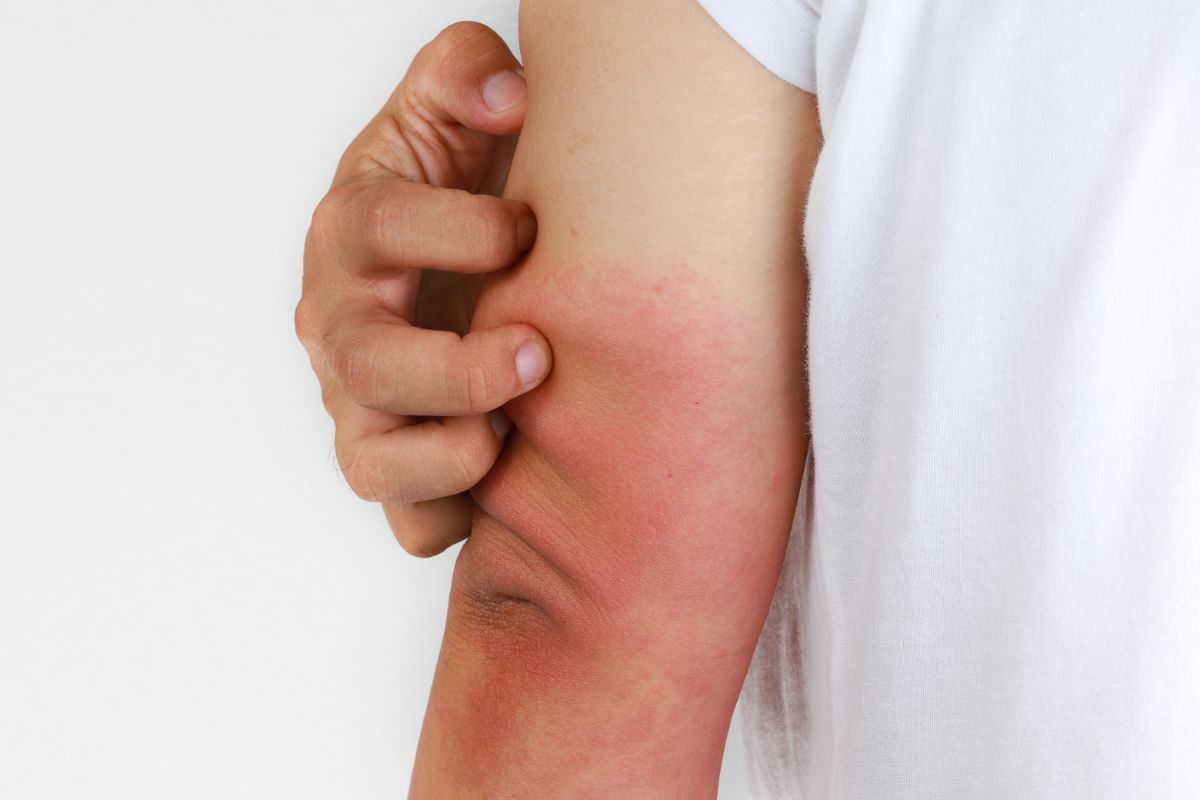Eczema has to be one of the most irritating health conditions a person can have. Whilst there are plenty of other, more life-threatening medical issues that can cause you more trouble, or last longer in many regards, it can often feel like eczema is always a thorn in your side whilst you are suffering from it.
You are constantly itchy and feeling itchy, your skin feels raw and stings where you have scratched it too much, and you don’t know where it might flare up next.

This relatively low, yet constant, irritation that eczema brings with it, one that has no cure to keep in mind, has led many people to search for ways to help treat or control the outbreaks as they appear across your body.
These searches have yielded results both clinical and natural, from totally successful to mixed success.
With so many pharmaceutical and home treatments available, it can be difficult to keep track of which ones have been proven to work at treating this skin condition.
Take salt water, for example. Sea and ocean water has long been believed to be good for people, including for treating eczema and psoriasis.
Not to mention that covering almost 70% of the planet’s surface, there’s no short supply of it either!
So, in this article, we are going to briefly cover what eczema is, and whether or not the benefits of saltwater for it are based on any true science.
We’re also going to cover a few other treatment options as well, for those people who aren’t exactly keen on saltwater.
What Is Eczema?
Whilst most of the people reading this article probably already have at least some ideas of what eczema is, there are also plenty of people who have only just recently heard of it.
Perhaps they have been fine for years, only to develop it recently after a stressful event. Or maybe their child has just started showing symptoms.
To briefly explain this very prevalent condition, eczema is an inflammatory skin condition that irritates a person’s skin.
This irritation can manifest in several ways, from simple itchiness, to dry skin, to thicker patches of skin that almost have a scaly texture to them, to rashes popping up spontaneously across the body.
There are several other symptoms that a person with eczema can show, and there are several variations of it.
Eczema is very prevalent amongst the general population. It is estimated that approximately 31 million Americans suffer from eczema.
Whilst most of these cases are in children, it is also possible to develop it at virtually any stage of your life, whether it is from young teenagers to adults in their 70s.
What Causes Eczema?

There are several reasons that a person can develop eczema for a time before the symptoms seem to fade as quickly as they appeared.
- One of the main causes that have been identified by researchers is changes in a person’s immune system. From time to time, your body may overreact to minor allergens that a person has, or even to irritants that the person is around. Whatever causes it, the overreacting immune system can cause a person’s skin to become irritated, which results in the raw-red skin that meany eczema sufferers have
- Alternatively, the reason for a person developing eczema (see also ‘10 Best Eczema Creams For Flare-Ups‘) can be genetic. It has been shown that a person is more likely to develop eczema at some point in their lives if a family relative has also had eczema. It could be linked to common allergens that are found in a family as well.
- Stress has also been known to be a contributing factor to developing eczema. Periods of your life where you have felt particularly stressed out can cause changes in your immune system, particularly if that stress affects factors such as your diet. Those interruptions can trigger an overreaction in your system’s responses, leading to the blemishes and rashes that we mentioned before.
Is Saltwater Good For Treating Eczema?
So, now that we have a decent understanding of what causes it, we’re now going to answer the question that we posed at the beginning of this article: Can saltwater help treat eczema?
Well, generally speaking, eczema-riddle skin benefits from large amounts of potassium, calcium, and magnesium, which you can often find in most types of sea salt.
So, by that logic, sea or saltwater is an excellent low-cost way to help lessen the effects of eczema on your skin, thanks to the high-magnesium content of saltwater, which is excellent for counteracting the inflamed skin that eczema causes.
It also helps treat the itchiness that eczema causes, which helps to stop its biome even more inflamed.
So, in some ways, the answer to the question is yes! Saltwater is very helpful for treating Eczema!
Other Eczema Treatments
Of course, not everyone has access to saltwater nearby. If that is the case for you, then you may want to consider one of the following options to help treat tour eczema:
- Medication – This is probably the option that will give you the best results for treating eczema. Hydrocortisone is the most popular medication that is often given to sufferers, though you should check with a health professional first
- Phototherapy – UV Light therapy can help keep your immune system in check. Be careful with this option, however, as overexposure can raise the risk of developing skin cancer if done too much.
- Warm Water bathing – This will help keep your dry skin moisturized, which will hopefully lessen the itching.
Conclusion
As you can see, saltwater can do your skin a world of good, especially for those people that can’t seem to get rid of their eczema rashes and itches.
And, if that doesn’t seem to work out, do not hesitate to try some of the other alternatives we have mentioned here!
- Understanding Male Reproductive Health: A Complete Guide - February 2, 2025
- Simple Healthy Skin Habits for Radiant Skin - December 6, 2024
- Unlocking the Connection Between Nutrition and Mental Health - December 3, 2024








